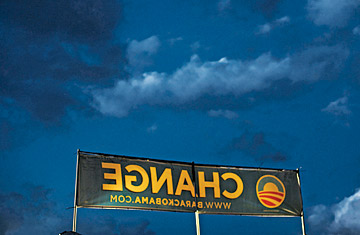
(5 of 5)
Everybody's Doing It!
Which message would persuade homeowners to save electricity: a call to their environmental conscience, or an appeal to their wallet? Cialdini tested those approaches in a San Diego experiment, and the answer was neither. What worked was an appeal to conformity. Residents used less power when they were told their neighbors were using less power. We're a herdlike species, more likely to be obese if our peers are.
In a 2005 study, Alan Gerber of Yale got Michigan voters to increase their turnout an amazing 8.6% with a single peer-pressure mailer that listed the previous voting records of their neighbors and noted that a follow-up would be sent indicating who voted this time. (The Obama campaign actually priced out a similar mailer but decided not to risk a backlash.) And shame works; even some AIG executives gave up bonuses. Cialdini says brain imaging shows that when we think we're out of step with our peers, the part of our brain that registers pain shifts into overdrive. "It's an incredibly powerful spur to action," he says. (See 25 people to blame for the financial crisis.)
Social norms help explain the attraction of opt-out 401(k)s as well: it's not just that we're too lazy to check a box but also that we assume the default is the accepted thing to do. Obama's push to weatherize millions of homes — another stimulus bonanza — will require new norms. In Oregon, a countywide program to upgrade windows and insulation at almost no cost to homeowners got a tepid response. But after an intense mobilization campaign — through citizen councils, churches and Girl Scouts who went door-to-door asking residents why they hadn't weatherized yet — 85% of the county enrolled. "What worked was creating a sense that we're all in this together and you're a social deviant if you don't join us," recalls Ralph Cavanagh of the Natural Resources Defense Council. This is why community report cards help promote preventive health care and why interdorm conservation competitions help colleges save energy. And this is why Administration officials — after their crash course in run-on-the-bank mentalities cited in Animal Spirits — are trying to boost consumer confidence into a social norm.
Sometimes We Need a Shove
But we're not likely to spend if we don't have money. And we can't take public transit if there's none in our neighborhood. The bully pulpit has limits — Michelle Obama has literally urged us to eat our broccoli, but she can't make it taste like fudge. "I like nudges, but sometimes we need to do more," says Harvard's Mullainathan. Sometimes we need a shove. The research proves change can come about when it's easy and popular, but making it lucrative — or even mandatory — can make sure it happens.
This is one reason there's new interest in taxing gas, alcohol, electricity and even trans fats to discourage undesirable behaviors while closing budget gaps. Obama has already hiked taxes on cigarettes and wants to end tax breaks for drilling and offshoring. He seems even more eager to subsidize desirable behaviors like saving, teaching, weatherizing and buying fuel-efficient cars and energy-efficient appliances. Of course, his energy policy goes beyond incentives; he wants a strict national cap on carbon emissions. He has also signaled openness to a national health-insurance mandate. (Read "The Year in Medicine 2008: From A to Z.")
If neoclassical economics wants government to let us alone to do what we want, behavioral economics leaves room for government action to help us do what we would really want if we were rational agents. Unfortunately, the qualities that have crippled Washington in recent years — inertia, denial, allergy to complexity, preference for short-term gratification over long-term planning — are our own flaws writ large. Members of Congress are people too; they're likely to embrace change only when it's easy, popular and rewarding. Do we really want them trying to change us?
Michelle Obama warned us during the campaign, "[Barack] is going to demand that you shed your cynicism, that you put down your divisions, that you come out of your isolation, that you move out of your comfort zones, that you push yourselves to be better." The President reinforced this in his Inaugural Address when he urged Americans to set aside childish things and choose hope over fear. (See pictures of how Obama prepared his Inauguration speech.)
But we don't need to change our hearts like that. Opt-out 401(k)s, simpler mortgage applications, programmable thermostats and cost-effective medical protocols can help us do the right things even if we remain ignorant, lazy, greedy and obsessed with childish things. It doesn't matter if we save energy because we care about the earth or our money or our neighbors; we just need to save energy. The government just needs to provide the right rules, incentives and nudges to help us make the right choices. It would be nice if Obama could change our social norms so that green living and healthy eating and financial responsibility would be new ways of keeping up with the Joneses. But it would be enough if he changed Washington's social norms. We need better policies, not better attitudes.
Behavioral literature can be a depressing window on human folly. But it offers us ways to transcend our folly, to restrain our ids, to harness our conformity and inertia and weakness in order to do less of the things that hurt us and our country. "In the physical world, we understand our limitations," Ariely says. "Nobody gets upset because we can't fly. We just design something to help us fly." If Obama can help us fly from our bad habits, he'll provide the change we need.
The original version of this story misidentified Mike Moffo as a field director of Obama's campaign.
